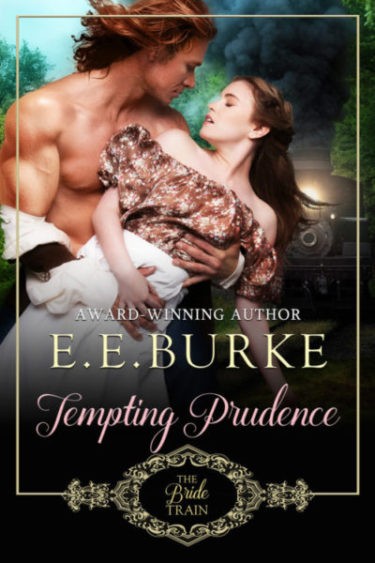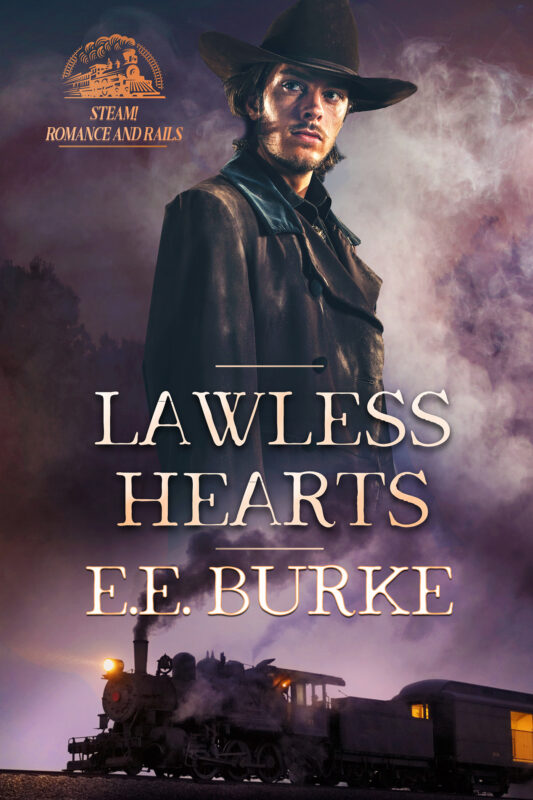NEW! THE BRIDE TRAIN, Book 3
A spinster, a bootlegger…an unexpected chance at love.
Leaving the safety of her old life, Prudence Walker rides the Bride Train west to the end of the line. Her last chance at matrimony. She’s too plain to inspire desire. Nor does she expect to find love. She does have her standards, however.
Arch Childers longs to put down roots, only he’s too busy managing his family’s illegal whiskey business to pursue his dreams. His troublemaking brothers, deciding he needs help, kidnap a spinster lady and present her to him, bound and gagged, as his bride.
Prudence isn’t immune to the charming scoundrel, but a bootlegger is the last man on earth she would marry… That is, until Arch sacrifices his freedom to save her.
Tempting Prudence, Book 3 in The Bride Train series, releases Aug. 11. Preorder your copy today.
Moonshiners and Bootleggers: a colorful history worth retelling
The term moonshine originated in Europe and was used in the England in the 1700s. It originally referred to occupational pursuits that necessitated night work, or work by the light of the moon. Those who made illegal whiskey worked at night so the smoke from their stills couldn’t be seen.
The term Bootlegger is believed to have originated in colonial America in reference to white men who sold alcohol to Native Americans. The practice was frowned on (for many reasons I won’t go into here), but the more determined peddlers wanting to trade spirits for material goods concealed bottles in the top of their boots.
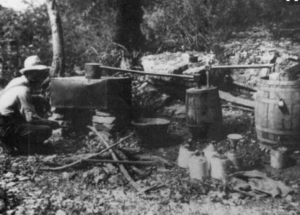 The terms are often used interchangeably, but strictly speaking, the moonshiner manufactured the illegal whiskey and the bootlegger transported and distributed it.
The terms are often used interchangeably, but strictly speaking, the moonshiner manufactured the illegal whiskey and the bootlegger transported and distributed it.
In Colonial America, distilling whiskey for home use wasn’t illegal and the time-honored process was carried out in thousands of homes. But when country exploded into civil conflict, the federal government needed tax money to pay for an expensive war. In 1862, Congress passed a law making distilling liquor without a license a federal offense, thus birthing an illegal distilling industry and furthering the long history of moonshiners and bootleggers.
Drinking was the top recreational activity for men in the Old West. Enterprising businessmen out to make money were eager to obtain a less expensive product and mark it up for a tidy profit. In some cases, before the railroads were built, homemade “fire water” was the only option.
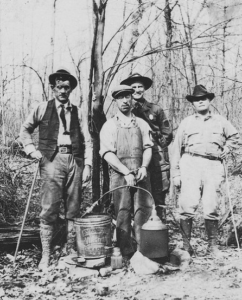 Do you know where the term “fire water” came from? When the Indians purchased liquor, they determined the quality by the “kick” it provided. The stronger, the better. To test, they would toss some of the liquor onto a fire. If it flared up, they would deem it of good quality. Considering what was added to the liquor to provide the kick — things like gunpowder and arsenic — the “fire water” test might not have been the best quality control process.
Do you know where the term “fire water” came from? When the Indians purchased liquor, they determined the quality by the “kick” it provided. The stronger, the better. To test, they would toss some of the liquor onto a fire. If it flared up, they would deem it of good quality. Considering what was added to the liquor to provide the kick — things like gunpowder and arsenic — the “fire water” test might not have been the best quality control process.
Some moonshiners would age their liquor in charred oak barrels to give it the appearance and flavor or aged bourbon whiskey. Other purveyors who sold to the public would purchase “white lightning” in its raw form (generally clear and colorless) and use different additives to please purchaser’s tastes.
Additives for color and flavor included chewing tobacco, tea, coffee, prune juice, tea bark, burnt sugar, molasses, sagebrush, red pepper, dried peaches, black bone meal. Chemical ingredients such as tartaric acid, sulfuric acid, ammonia, strychnine, turpentine and creosote would make its way into the mix to add a little “bite.” That could be a deadly bite!
Among pet names for whiskey on the frontier is one of my favorites: “Forty-rod.” Meaning, the drinker could expect to travel around forty rods (220 yards) before the booze kicked in and he collapsed. White Lightning is a ubiquitous name everyone had heard about. Here are some of the less well known but equally colorful names: skull cracker, popskull, stumphole, bush whiskey, ruckus juice, rotgut, catdaddy, mule kick, panther’s breath, alley bourbon, happy Sally, jump steady, see seven stars, old horsey, wild cat.
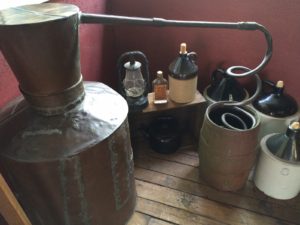 If the distiller was conscientious, he used clean equipment and made the best product possible. He took pride in his craft and earned respect amongst his colleagues and customers. At the same time, moonshiners were looked down on as lawbreakers and considered outside of “proper” society. Keep in mind, Victorians privately enjoyed the vices that they publicly condemned.
If the distiller was conscientious, he used clean equipment and made the best product possible. He took pride in his craft and earned respect amongst his colleagues and customers. At the same time, moonshiners were looked down on as lawbreakers and considered outside of “proper” society. Keep in mind, Victorians privately enjoyed the vices that they publicly condemned.
Out in the Old West, illegal stills became the target of law enforcement officials who sought to shut them down. To avoid detection, stills were often located in remote mountainous areas with thick forests, such as the Missouri Ozarks.
In Tempting Prudence, Arch Childers is a bootlegger from the hills of southwestern Missouri. He stakes a claim on railroad land over the border in Kansas and sells his family’s moonshine to area saloon owners. Arch keeps a low profile around town, but he has a bad reputation due to his profession, as well as his association with his troublemaking brothers.
Prudence is deeply religious and fiery in her opposition to liquor, most especially those who peddle it. When she first meets Arch, she’s sure he’s as bad as the men who abducted her. As it turns out, he isn’t the scoundrel she expects him to be.
Can a “daughter of temperance” find happiness with a bootlegger?
Check out an excerpt from Tempting Prudence, or read more about the first two books in the series.
This month, I’m also holding a Bride Train #giveaway on my Facebook Page. Like my page, and click on Giveaway (tab) to enter the raffle for your chance to win three ebooks from the series, an autographed copy of Valentine’s Rose and $10 Amazon gift card. https://www.facebook.com/AuthorEEBurke/
